Our public engagement and outreach activities over the past five years.
Big Biology Day, October 2024
The Department took part in the Big Biology Day, held at Hills Road Sixth Form. We ran three activities; creating candy DNA, observing fly mutations and windowing of chick embryos.
Attendees had the opportunity to observe different fly mutations under the microscope and learn about their development.
Our researchers also demonstrated the technique 'windowing' so we can observe chick embryo development. These embryos are used to look at the very early stages of brain development; to work out when and how the early neural cells segregate into forebrain, midbrain, hindbrain and spinal cord.
Interested in how this is done? Come and watch our video.
We also had an activity where attendees could make their own double helix structures using sweets. They had sweets identifying as the four chemicals (A. T, C and G) which they would pair up and add to the DNA "backbone". The model then needs to be given a twist and then ta-da a double helix! Which didn't last long before they were eaten...
Our volunteers were Lottie Groocock, Alejandra Guzman Herrera, Tharini Kumar, Constantina Laou, Alex Neaverson, Ritwick Sawarkar and Alice Yuen.
Magdalene College Residential, April 2024
The Department hosted fifteen Year 12 students from Merseyside and the Isle of Man as part of the annual Magdalene Residential. The group was split into two and did the two organised activities:
As a research group that uses fish and chick embryos as models to study development biology, the Steventon group guided pupils through various experimental techniques used in the lab. The goal was to spark the pupils' curiosity and inspire them to join the science community in exploring the wonders of the natural world.
Using a technique called windowing, the pupils were taught how to make a hole in the eggshell of 3-day old chick embryos. They observed the head, tail, beating heart, eyes, blood vessels and in some cases the early limb buds. They were also taught to inject ink underneath the embryo to increase contrast for better visualisation. (Activity ran by Bassel Arnaout, Alex Neaverson, and Yuri Takahashi)
The pupils were introduced to zebrafish development and shown live zebrafish at various developmental stages. They observed distinct anatomical features that are typically used to identify the age of the zebrafish. They were also taught to use the fluorescence microscope to visualise green fluorescent protein expressed in the neurons and pumping heart of transgenic zebrafish. (Activity ran by Carlos Camacho, Nick New, and Dillan Saunders)
The volunteers were Bassel Arnaout, Carlos Camacho, Alex Neaverson, Nick New, Dillan Saunders, and Yuri Takahashi

We split the groups into two, and started off with a short presentation on the basics of synthetic biology, and some of its common and interesting applications. We then ran a group brainstorming session, where both groups came up with some really interesting potential new applications of synthetic biology. From memory, one example was creating vegetables that taste nice; and a new way of producing energy in a renewable way.
The volunteers were: Lisa Milne, Jamie Terry, Cenyujia Wang, and Roger (Zijiao) Wang
Bright Horizons Nursery, March 2024
A team of volunteers from the Steventon Group attended Bright Horizons Nursery and hosted two activities. The children had the opportunity to make liquid rainbows from liquids with different densities. The children also pipetted different coloured liquid into a 12-well plate to make a pattern.
Our volunteers were: Alejandra Guzman Herrera, Clara Mutschler, Nick New, Stephanie Telerman, Alice Yuen and Imen Lassadi
Cambridge Festival, March 2024
We had a fantastic team of volunteers help out at this year's Cambridge Festival. On Saturday 23rd and Sunday 24th March we ran various activities including extracting DNA from a strawberry, creating candy DNA and pipetting fun patterns.
Our volunteers were: Sean Scinta, Alexandra Neaverson, Tharini Kumar, Mark Fernandes, Aishani Chakraborty, Kate Baker, Juliette Davis, Ariella Weinberg-Shukron, Alexandre Porcher Fernandes, Alex Cagan, Dillan Saunders and Emily Kempin.
School Visit, February 2024
Dr Welch visited KS3 and KS4 students and introduced the field of evolutionary genealogies, and tried to show how tracking allele frequencies and inferring genealogies gives us a set of tools for understanding all of life. He showed how the tools are both useful for tracking pathogen outbreaks, and essential for understanding the extraordinary examples of apparent design in nature.
Our volunteers were: Dr John Welch
Big Biology Day, October 2023
The Department took part in its first Big Biology Day which was held at Hills Road Sixth Form on Saturday 14th October. We had a variety of hands-on activities including a Genetic Jenga, DNA origami, an ethical card game and an all-time favourite of studying different fly mutations under microscopes.
Our volunteers were: Lottie Groocock, Fariha Jawed. Nick New, Cahir O'Kane, Seun Ogundele, Sean Scinta and Alice Yuen.
Cambridge Festival, March 2023
We had a fantastic team of volunteers help out at this year's Cambridge Festival. On Saturday 25th March we ran various activities including extracting DNA from a strawberry, studying different fly mutations under microscopes and creating viruses'.
Our volunteers were: Ellie Blake, Simon Collier, Lottie Groocock, Katy Grobicki, Charlotte Houldcroft, Gloria Jansen, Fariha Jawed, Alex Neaverson, Sean Scinta and Avinash Srivastava.
Insight Explore, October 2022
Stephanie Telerman, Tamsin Samuels and Avinash Srivastava presented to a group of fifty year 10 and 11 students on exploring DNA, gene mutation and the different questions that genetics looks into. The students got to view drosophila with different mutations and zebrafish embryos at different life stages.

There was also a mini subject fair in which Katy Grobicki interacted with the students and gave them insight into the Part II Genetics course as well as postgraduate life. You can find out more about the Insight Explore programme here.

I'm A Scientist, November 2020
Katy Grobicki, PhD Student from the Karam-Teixeria Lab, took part in I'm A Scientist in November 2020. I'm A Scientist connects students to scientists, allowing primary and secondary school students to quiz scientists about their research, their day to day life, and any other science topics the students are interested in. Classes book sessions where students can live chat to scientists, from school or from home, so this has been a great outreach activity for lockdown.
"In my first sessions, the students have asked questions covering topics as varied as cancer, Alzheimer's, cloning, antibiotics and how genes are switched off and on, as well as asking about what we enjoy as scientists, how we carry out experiments, and how we became scientists."
Stem Cells @ Lunch Podcast, October 2020
Alfonoso Martinez-Arias was interviewed on 10 October 2020 by PhD student Alice Vickers. Alfonso discusses the applications, ethical considerations, legislation, and difficulties of progressing his research using embryonic stem cells as a model system for studying human development. He also looks back at the experiences and experiments that hooked him on answering the vital question of how a single cell becomes a whole organism. The podcast is available here.
Widening Participation School Residential, February 2020
Elves Duarte from the Jiggins Group delivered a subject-based talk to Year 10 students from Reach Academy Feltham titled 'How insects fight microorganisms?' on 25 February 2020.

Elves kindly provided an abstract of the talk:
Insects are one the most diverse group of organisms, including approximately half of all described animal species. Part of this evolutionary success relies on interactions with microorganisms which allow them to expand the range of ecological niches they occupy. The fruit fly Drosophila melanogaster is one of the best-studied insects in the world providing insights into how immune systems defend animals against microbes, including how infection leads to the activation of innate immunity. In recent years, studies, in Drosophila identified a bacterium called Wolbachia that makes insects resistant to viruses. As a consequence of this discovery, Wolbachia was transferred into mosquitoes, where it is being used to prevent the transmission of viruses that can cause disease in people. Due to their rapid reproduction and a simple life cycle, insects are easily grown in the laboratory which has resulted in fundamental insights into how animals and microbes interact.
Big Biology Day, October 2019
Laura Bond, Alexis Braun, Gaspar Bruner-Montero, Alex Leitao, Arunkumar Ramesh and Ghazal Seidi took part in the Big Biology Day at Hills Road Sixth Form on 05 October 2019.
Attendees got to play an interactive game to show what a large number of biologists do daily, identify common Drosophila melanogaster phenotypes. They also played a game where they identified different species of fruit flies that are worked on in the department. We also had a demonstration of a fruit fly larvae actively defending itself against parasitoid infection under a mounted microscope and explained the parasitoid life cycle in relation to the Drosophila melanogaster life cycle.
Insight Outreach, July 2019
For the third year in a row, Arunkumar Ramesh and Alex Leitao from the Jiggins Group have contributed to the Cambridge Insight Outreach programme and welcomed Year 9 - 11 students into the lab.
Target Oxbridge Easter Residential
Rebeca Ridings-Figueroa from the Glover Lab presented an insight into cell biology and, in particular, cancer to students from the Oxbridge programme. The students gained an understanding of how cancer cells develop and spread as well as prevention and different treatments.

Cambridge Science Festival 2019
Members of the Department took place in the Cambridge Science Festival 2019 by opening up the tea room doors to the public on 16 March and having a range of hands-on activities available. >> more information here.

Sciences Taster Day "Solving the Problems of Tomorrow", February 2019
On 07 February Chris Illingworth delivered a session titled "What do you get if you cross mathematics, evolution an the global challenge of drug resistance?" as part of the Sciences Taster Day. The event was aimed at Year 12 students and targeted schools with a larger than average proportion of students on Free School Meals. During the course of the day, students attended a number of different workshops provided from a range of different departments.
Key Stage 4 - Discovery Days, January 2019
Maria Ouvarova from the Russell Lab took part in the Key Stage 4 Discovery Days programme on 18 January 2019. Maria delivered an interactive talk to a group of GCSE students, engaging them with scientific and philosophical questions which can be investigated experimentally. They looked at X-linkage associated with colourblindness and distinguished this from the monochromatic vision experienced by those with lesions in specific brain areas. This idea was developed to question whether the brain is modular or not. Maria really enjoyed and experience and the co-ordinator quoted "the kids really seemed to enjoy themselves, despite being occasionally endangered by flying Haribo!"






